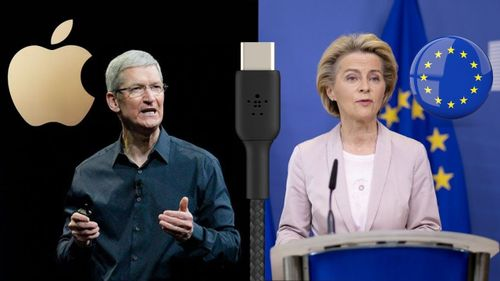- Featured
- New Mobiles
- Find New mobiles
- Latest Mobiles
- Upcoming Mobiles
- Popular Mobiles
- Gaming Mobile
- Compare Mobile
- Budget
- Under 10,000
- Under 20,000
- Under 25,000
- Under 30,000
- Under 35,000
- Under 40,000
- Under 50,000
- Over 50,000
Ad
Ad

EU drops another bomb on Apple
3,591 views
Follow Us:
3,591 views

The new law requires companies to meet gatekeeper standards, but it is clear that Apple has not done this, at least as far as the company's operations and revenues are concerned, to avoid EU scanners.
The Digital Markets Act (DMA) requires messaging apps to be interoperable. That would force Apple to work with RCS Messages on Google and even share that network with Whatsapp.
Sideloading on iPhone may become possible in the near future
But the bigger concern for Apple has to do with the App Store. The DMA wants companies to open up their platforms to third-party app stores, which is already possible with Android, but the prospect of working with developers on an interoperable level leaves Apple behind.

That's not all. Apple may also be forced to allow sideloading on iOS. This is something the company has always opposed for security reasons. It must be said that the EU has been aggressive in recent years with various measures, putting brands like Apple in a position where changes in their policies are inevitable.
Earlier this year, the EU passed legislation requiring all mobile devices to support USB-C charging. Apple has already confirmed that it will comply with the law but has not provided a timeline for implementing the change.
And the new DMA ruling is another hammer in that plan, forcing companies to comply with the new terms by March 6, 2024. Changes to Apple's charging standards must also be implemented by 2024. That means the iPhone 15 variant could feature USB-C for charging.
Personal take on the issue
I am all for USB-C on iPhones but forcing companies (Apple or any other) to make such drastic changes does not seem fair. After all, if all companies share the same standards there will be no competition between them. And ultimately no competition means slow innovation.
Latest News





Reviews & Guides
View All

Best Gaming Smartphones for September 2022

Best LG Television To Buy In 2022

Luxury Watch Brands for women

10 Best Watches Under 15000 in India 2025

New UPI Rules from April 1, 2025: What’s Changing and How to Prepare

Swiggy Instamart Revolutionizes Shopping with 10-Minute Smartphone Delivery Across India

Made-in-India Smartphone Shipments Surge 6% in 2024: Apple and Samsung Lead the Charge

Nothing Teams Up with Royal Challengers Bengaluru for IPL T20 Season 2025: A Bold Move in Tech and Cricket







